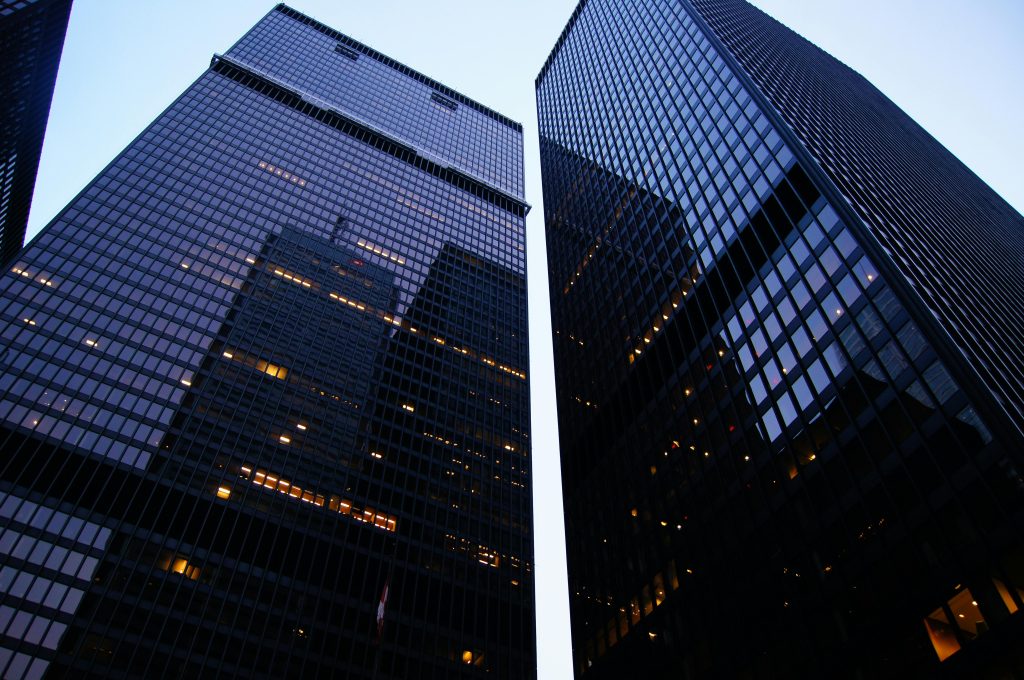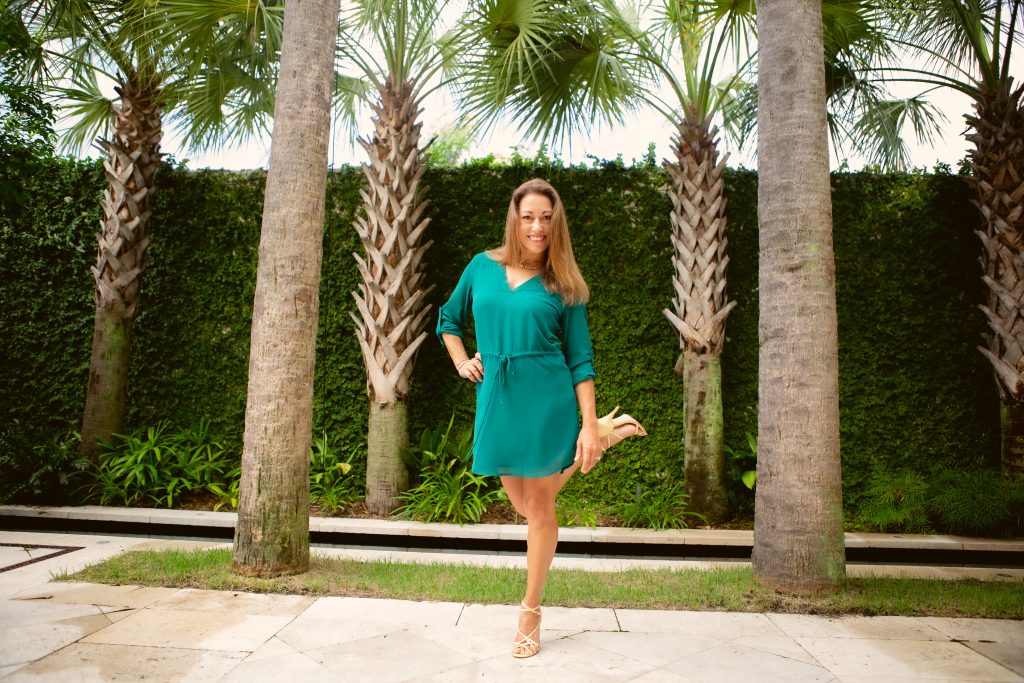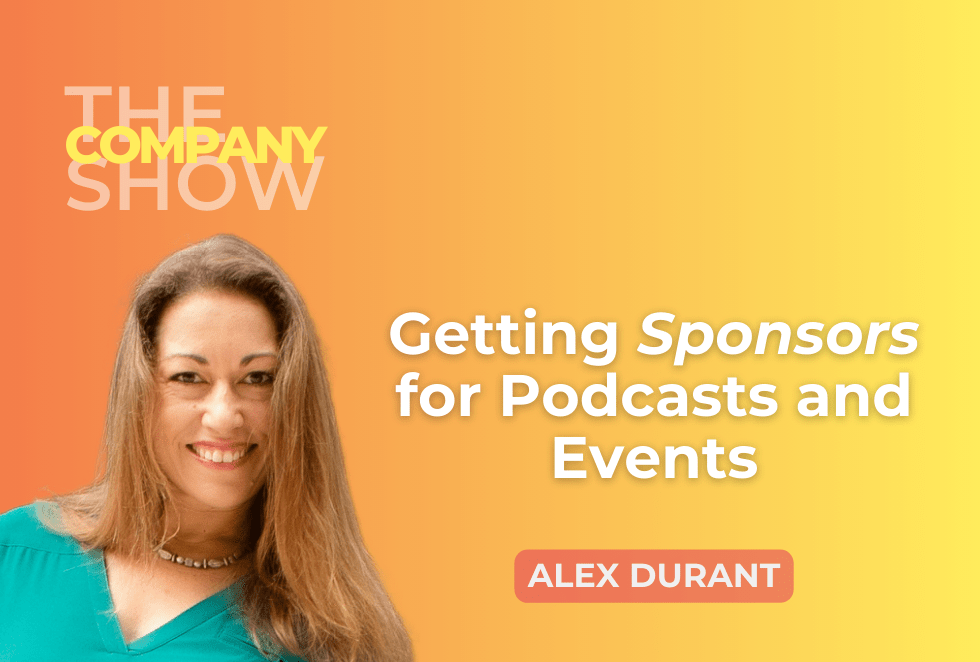I often say that sponsors aren’t a great path for most company podcast—the ROI just isn’t there when other business goals are more immediate and more valuable than the income that can be generated by sponsors.
But most is not all, and if it’s a path you’ve deemed the right one for your show, I want you to have all of the information you need to create a great package.
So, sponsorships! I’ve never had them for this show, nor have I arranged them for the Podcasting for Business Conference so far—although that will be changing this year!
That means I don’t have the absolute latest, up-to-the-minute best practices on what makes a great sponsorship package, and how to communicate them. I’m lucky enough to know someone who does, however.
Alex Durant is the owner of Durant Consulting Inc., where, essentially, she takes everything that can be a nightmare about coordinating large events with lots of sponsors and takes care of everything.
She works with companies to develop sponsorship packages and decks and coordinates to make sure everything is delivered as promised. For this reason, she is extremely sought after. I can tell you, if wrangling sponsors is anything like wrangling affiliates for big events; it’s a huge job with a lot of moving parts.
It was actually talking to Alex that convinced me to open up the Podcasting for Business Conference to sponsorship this year. I’m so excited to bring you our conversation, where Alex shares how to think about sponsorship as it relates to your podcast and environment.
Listen to the episode below or continue reading the blog post!
Tune in to the full episode to learn about:
- How to incorporate sponsors into different podcast formats
- The sponsorship real estate
- Sponsors: When to look, how to choose, how to approach
- Leveraging industry connections for visibility
- How to build your sponsorship deck
- Ensuring clarity in sponsorship contracts
- The recap deck
- How to deal with a disappointed sponsor
- Technical issues with podcast ads
How to Incorporate Sponsors into Different Podcast Formats
Now, sponsors don’t work on every type of podcast. If you’re angling for conversions to your email list or other products or services, then a sponsor is going to make it harder to reach your goals, not easier.
A Relationship Building show can have sponsors that don’t detract from the connections you’re making with the guests. It’s a good idea to let your guests know the show is sponsored and if you need to include any particular verbiage about sponsors while you’re recording the episode, just to avoid any potential confusion.
If possible, let your guest know in advance that you’re going to call for the sponsor break at a ‘cliffhanger’ moment after you’ve teased that you’re going to share something big, but before sharing it or right before the resolution to a conflict or dramatic moment in the conversation.
Content shows, because they are so flexible, can also include sponsors. No special considerations one way or another here other than that you will have to make sure you do enough promotion and audience cultivation work that sponsors will have an interest in getting in front of your people!
Thought Leadership shows don’t often work well for sponsorship because they’re sharing really valuable brain space that should go to your brand and ideas rather than a sponsor’s.
This isn’t a hard and fast rule, however. For example, if there are lots of complementary (not competing!) businesses in your industry that you’d be happy to recommend anyway, that can be a win-win situation.
For any of these, remember that every listener who follows a sponsor CTA is probably not following one of yours.
The real winning Blueprint for Sponsorships is Audience Engagement.
What you’re effectively doing is building a new product (your audience) that you can sell to a new customer (your sponsors), so focusing on the audience and designing a show accordingly is the best way forward.
Now, here’s what Alex Durant has to say.
The Sponsorship Real Estate

Alex: “Maybe I notice it because I’m in sponsorship, but sponsors are all around us.
If you’re watching TV, you see the cup of a specific major coffee chain sitting on the table of the judges’ desks. If you’re watching sports, whether in person or on TV, you see that they have sponsors in ads, on their uniforms, on their hats.
I personally think we’re surrounded by sponsorships, whether we really take notice of it or not. Even the local t-ball team for eight-year-olds has been sponsored by so-and-so pizzeria on their t-shirts.
Sponsorships are everywhere, and I think you can apply the concept of sponsorship to pretty much anything, whether you’re hosting a conference or a retreat or a festival or a gala, or have a podcast.
My biggest thing is you want to look at your sponsorship real estate is what I call—what do you have to offer back to the sponsor? If you’re in person, of course, that’s going to encompass any physical space at your event.
Can the sponsor set up a table or can they brand the bar? Or is there bigger space for them to build some beautiful photo op or engagement activity with the guests or to give out talk about their product or service.
But looking from a podcast standpoint, the other sponsorship real estate to consider is obviously you have commercial breaks, but do you do an email marketing campaign to talk about your podcast? In that way you could have maybe ad placement or logo placement, or even a dedicated section, a blurb for your sponsor to have an inclusion in that marketing piece.
Do you do any social media surrounding your podcast that you could give them a dedicated post or do a shout out in a story? So you have to just look at everything, your website, is there opportunities for the sponsors to be included on that?
But then another item of sponsorship real estate I consider, especially in person, is there any opportunity for the sponsor or one of their representatives to speak at your event, whether that’s just to do a welcome or do a dedicated session.
So on a podcast setting, is there an opportunity for them to be a guest to talk about their business if it falls into alignment with what you’re doing?”
Megan: “That’s definitely a strategy we see sometimes is high-level sponsors of packages, and especially this tends to be in podcasts that are really highly niched.
Often when there are a lot of commodities or software as a service or a lot of products associated with an industry, that tends to make a really good match for podcasting. And that guest placement almost becomes like a magazine advertorial when you have the guest involved.”
Choosing the Right Sponsors for Your Podcast
Alex: “That leads me into my next step in the process—I call it the concept of brand rub.
So you as the event or the podcast you want to align with sponsors that make sense for your brand and what rubs off on you rubs off on them and vice versa. So if you’re doing a podcast about the benefits of sleep and you have different sleep experts as your guests every episode, you probably don’t want to get in the bed with an energy drink as one of your sponsors—pun intended completely.
It would make more sense to have a mattress, have any other type of you know products or sponsors that also are talking about health and well-being. What brands do you want to rub up against and what brands want to rub up against you because they’re going to elevate you and you’re going to elevate them.
A lot of times it makes, obviously I do a lot of wine and food festivals. That’s why they always have a lot of wine sponsors, spirit sponsors, but also lifestyle brands that are part of the wine and food festivals as major sponsors because they’re hitting the same demographic of guests.
That’s why big hotel chain will be a sponsor, a cruise line, a credit card company. Those all are brands that make sense for the mission of the event and vice versa.”
Megan: “So then it really kind of becomes an issue of specifically looking at business podcasting, finding complimentary businesses who are talking about the same things, talking to the same audience who are going to benefit from having access to that audience rather than anyone who’s willing to send you a couple of bucks for your ad read.”
Alex: “Exactly. Just because someone might be willing to give you some dollars, is it worth the reputation of having them as a sponsor? For your reputation, does it make sense at all?
Megan: “That question of worth is one that comes up a lot in our work because a lot of people who are podcasting as a business, they’ve got their own products and service to sell and that valuable airtime.”
Alex: “Especially I’d say when you are a newer show and when you are still developing the audience and you don’t have a whole lot of listeners, it’s going to be a lot better return on your investment and a lot better use of that space to talk about your own products and services.”
When to Approach Sponsors for Your Podcast

Alex: “You’ve got to put something together.
If you have no data, if you’re going into episode one, you need to show what your podcast is about, what the mission is, who your key demographic or key audience member is, and show that your goal starting from episode one.
It’s probably not the best time to be sending out sponsorship packages unless you’re just saying, Hey, I’m bringing this to market, I’m really looking for underwriters.
But once you have some data it’s important to show all of that you know you want to show how many people are listening repeat—just any analytics that you can put in your proposal.
But then, as I said before, anything else surrounding your podcast, if you’re sending out social media about it, then why don’t you put your engagement rate that you’re getting on Facebook or Instagram or X or whatever you’re doing?
If you’re sending out an email about the next upcoming episode, how many did it go out to? What was your open rate? What was your click-through rate? Anything surrounding your podcast that you’re using to market it could also feed into the analytics that you’re sharing with sponsors.
Megan: “That really changes the conversation, doesn’t it? Because if, say, I’ve got a new show and maybe I’m getting only 150 downloads a month, and that’s not a very impressive number to bring to a sponsor.
But if tied with that is my email list of 1,500 and then a LinkedIn following of 5,000, and if there are things that go along with all of that, then together combined, it makes a much more compelling offer.”
Alex: “Right. I think recently I heard that’s called your sphere of influence. If you’re sending it out to a larger networking group that you’re a part of, and they’re willing to share your posts and someone in that sphere has a hundred thousand followers, you can kind of use that not as in your deck, but as when you’re talking to someone, Hey, I also know it gets shared by this certain influencer or this certain person with this many followers.
They’re helping to boost your internal data.”
Leveraging Industry Connections for Visibility
Megan: “If you are negotiating a sponsorship and you’ve got really good friends in the industry, can you even just straight up ask for that kind of visibility bump on a sponsored post?
Or would you consider that something that is not done?”
Alex: “What’s the worst that can happen? They say no.
I see this all the time. The first place you go, if you’re wondering who sponsors X, Y, Z type event, you go to their event and you look at their sponsor page and then you think, well if I’m doing a similar type event, those are the types of sponsors that I should go after.
So I know that looking at competing podcasts even is gonna be a great place to start with seeing who’s willing to sponsor a podcast in this industry or around this topic. You also need to consider how big are the companies you’re going after. Do they have a marketing budget?
A lot of businesses are so big that making an approach to them is basically you’re entering an inbox labyrinth that you may never see the other side of and then there are a lot smaller companies maybe who have never done this kind of sponsorship or advertising before.”
How to Build Your Sponsorship Deck
Alex: “When you’re building your sponsorship deck or sponsorship proposal or sponsorship prospectus, whatever you want to call it, first off, you need to talk about your podcast.
What is it? What is your podcast about? Who are you as the host? Who are your guests joining the podcast? Then any key analytics that you can use as data, whether it’s about the audience or about your social marketing, your marketing, plan, marketing strategy, what your engagement is like.
Then you need to come up with your real estate.
What are you offering? What are you selling to the sponsor? And whether that’s tiered, if you come up with different sponsor levels, I hate to use gold, silver, bronze, but whatever they are, tier one, tier two, tier three, at a minimum, all silver sponsors get this.
They get the logo here, they get one post or mention, they get this they get that then, and that costs x amount of dollars. Then moving into silver you get all of the previous deliverables plus these extra things like why am I paying more money because you get more out of it.
Then the highest level you get all of the below plus this this and this.
It needs to be very clear, the sponsorship proposal. It can’t just be, call us for information. I want to see when I look at a proposal, just like when I’m booking a hotel room, well, how much does it cost? You can tell me all about the king-size bed or the suite or the two doubles and a twin, but if I don’t know the price for each one, am I going to call the hotel to ask? No.
So I want to see the deliverables, see what the benefits are, what am I getting out of it, and then know what I’m getting into to start the conversation. Then of course, once you start having a conversation and maybe there’s some flexibility of what you’re willing to offer or they’re asking for:
Actually, we don’t even do Facebook. We don’t have a Facebook. It doesn’t make sense for us to be on yours. Could we get two of these instead of one of those?
You have to be willing to be flexible instead of cut and dry. These are our packages. We’re not doing anything else but these three packages.”
How to Approach a Company for Sponsorships

Alex: “That’s probably a question more for your marketing expert that I know you’ve had a previous podcast with, but I think there’s something to be said with picking up the phone and really finding out who you could speak to.
Having a brief conversation, following up with the deck instead of just, what do they call like the spray method where you’re just like shooting this email out to blind all these BCC people that you’re just hoping someone responds.”
Megan: “Every introvert and half of all millennials have just hit stop on this episode.”
Alex: “Pick up the phone. What? What?”
Megan: “So let’s say cold calling or targeted cold calling is one approach.”
Alex: “That’s one approach. If you’re going to do an email, it needs to be very direct, obviously, and make sure it makes sense that they’re something that you’re promoting and there, you got to grab them right away of why they should even read further.
This is the podcast. This is what it’s about. This is a perfect alignment with everything that you stand for as a brand or as a service. It makes complete sense for you to be a sponsor, and now here’s what the offer is.”
Should you include the offer in the initial email?
Alex: “I don’t see why you wouldn’t have the proposal attached. Why make them do a second step?
I would imagine some people are going to think, I’m priced out. It’s probably too expensive.
Whereas if you have it attached, they look, Oh, wow, there’s some good options here that they’ve got different levels of pricing. There’s one I could actually afford. This is in alignment with my mission. Then they want to click to hear more or call you, schedule a call to hear more about it.
I’m not going to say it’s easy or else everybody would have sponsors. I do not do sponsorship sales. I just help people get it ready and then they can go after the sponsors themselves.”
Ensuring Clarity in Sponsorship Contracts
Megan: “Let’s assume someone is brave enough to get on the phone.
In your experience, is the person who’s going to make that decision the same as the person you’ll be coordinating with about all of the details.”
Alex: “Definitely not. Which brings me to all of that conversation from building that you have your sponsorship proposal, but then to building their specific contract needs to be captured in that contract.
You need to capture everything you’ve promised. Where their logo is going to be, how long it’s going to live on your website, for instance. If they’re getting social media, how many posts, what channel, is it across all channels? Is it only one channel?
I have certain clients that don’t allow any sponsorship posts on their Instagram. They keep it very proprietary and a sponsor post only goes on Facebook or maybe IG story.
So that has to be very clear because if you just say one social media post, that could be taken as, well, one social media post against all platforms. When is it going to run? Is it a week before the podcast airs? Is it after the podcast airs? Because that makes more sense that the podcast airs and then they see a social media post.
All of that needs to be captured in the contract because to your point, whoever’s doing the deal is going to be different than who’s actually taking care of those deliverables within that company. It might just be passed to some intern—Here’s what we’re getting. Send them our logo, create some content. They need to know exactly what’s been promised.
Megan: “I’m glad you brought up contracts because that’s a big issue. A lot of podcasts, even ones for professional ones from big companies operate without a lot of specific like releases for guests or any kind of protections around IP, anything like that, and that’s changing as the industry develops.”
Write It, Secure It
Alex: “You could always just do a smaller letter of agreement. Even if it’s a one-page document that’s, *we’ve agreed to these terms, here they are, bullet point, bullet point, bullet point—*signed and dated.
Why not have it on file? Is it even worth $500 to ensure that they’re going to pay you that money that they’ve promised, and you’re going to do the deliverables, and then once you do them, you know it’s done?
I would always back myself up with any kind of something in writing.”
Megan: “It’s good to have a paper that almost falls under clarity is kindness. If you get it on a chance, everybody’s got a chance to agree. Yes, this is what we’re doing—and then it makes really easy.”
What to Send the Sponsor After the Term

Alex: “Any reporting that you can give, you call that a recap deck, your official recap, is fantastic.
Even if it’s a simple one page of this is how many podcasts we did this year, you were a part of a series of three out of 20, or maybe they signed up for all, or maybe they just did one, that particular podcast episode had this many downloads, the social media surrounding it had this many clicks, this many open rates, we deployed this many stories.
Whatever you can show to back up as backup data so they can review and see the ROI for their sponsorship. Then you take that recap deck and move it into, let’s talk about next year, re-upping the contract terms. Now that becomes part of your next proposal is the recap from last year, from the previous term.”
How to Deal with a Disappointed Sponsor
Alex: “You definitely need to be completely transparent.
I’ve had a festival where maybe they didn’t sell as many cocktails as they thought they were going to. But then you have to say, was it because we had bad weather and we didn’t have as many guests?
Was there a reason that makes sense? I don’t know what would go wrong in a podcast, but maybe there were technical difficulties, and that made the listeners exit out. I don’t know, but…
Megan: “Maybe the possibility is if you’re a tech podcast and you talk about tech news and you’ve got your sponsor on, but then all of a sudden another podcast gets the exclusive scoop on Elon Musk’s new purchase.
That’s going to take all of the listening attention and there’s just nothing to be done in that situation.”
Can You Find Guarantees in Sponsorship Contracts?
Alex: “Not in the contracts that I’ve seen.
You’re telling them what you know you can give them and you’re going to promise that you’re going to deliver that, but you don’t give a guarantee of how many people will click it if we put it on social media.
How many people will sign up for their offer if they gave you a dedicated post that had a 10% off or a 20% off? There’s not that guarantee included, no.”
Podcast Sponsorship Advice from Alex Durant
Alex: “Give it a go. Put a little proposal together.
You obviously are doing a podcast because you believe in it and you believe in what you’re putting out there. There’s more than likely someone else that’s going to believe in it and wants to support that and knows that their brand or service is in alignment with what you’re doing and it’s going to make sense.
But you have to put the proposal together, send it out into the world. People say to me, can you help me get sponsors for my event? And I say, sure, send me your sponsorship proposal. I’ll look at it and see if it—you know, I don’t do sales, but if there’s someone I know that in the industry…
Then they say, Well, we don’t have a sponsorship proposal.
So what did you think was going to happen? You were just going to say out loud, Hey, I want sponsors for my podcast and the phone was going to start ringing. You have to have something.”
Megan: “What I hear is the heartbreak of all marketing. It’s just, we’re brilliant. We put out wonderful content. Our services are amazing. Why are people not flocking to us? Because we are here.
Alex: “You have to ask, or people may not know you’re even looking for sponsors for your podcast.”
Connect with Alex

Alex: “If you’re feeling overwhelmed, if you’re hosting an event and you haven’t even thought of where to start with putting together a sponsorship proposal, I’d love to help with that.
I walk in a room at an event and I immediately think how come that bar doesn’t have sponsored by so-and-so or why isn’t the music have a little sign next to it saying presented by so-and-so. Everything I look at, Oh, that could be sponsored. That could have a sponsor. That could be sponsored.
So I’m happy to do that.
I also do work with larger events if they need many sponsors, creating their sponsorship communication, not necessarily a podcast, but in a bigger event, once all these sponsors start signing on, they want to know what’s going on.
When are the social media deliverables due? What are the specs for that content? When are they getting their tickets? How many staff credentials do they get? What time is the load in?
So I help put all that communication together. Then again, I manage the sponsors on site so that I make sure they’re happy, they know what’s going on. If their power goes out, they can call me and then I’m on radio and can call the event team to get it back up immediately. It’s like a dedicated white-glove concierge service on site.”
Website | Instagram | LinkedIn | Facebook
Podcast Ads: The Technical Side
Now that we’ve had that extremely useful run-through of the different kinds of sponsorship that you can negotiate, what might go into a comprehensive package, and all of those other amazing details, I want to quickly address one of the technical issues that you’re going to run into if you want to do ads within your podcast itself.
You’ve got two options: baked-in or dynamic ad insertion or DIA.
Baked in means that you’re going to record the sponsor advertisement like it’s a regular part of the body of the episode. It’s a permanent part of the show that’s always going to be there.
This can be fine if you know that the ad you’re sharing is going to be relevant forever and you don’t ever want to replace it with something new.
Dynamic ad insertion, on the other hand, or DIA, means that you leave a space often with some transitional verbiage before and after it like we’ll be right back and we’re back, and use your podcast host to add ads that can be changed retroactively into the future.
These can be found in marketplaces, maybe that your host provides, they can be ads provided to you by your sponsor or ads that you produce independently, but it’s a separate audio file that is added to the host separately from the main body of audio and has its own configuration for when it plays and to whom.
All things being equal, if your host allows dynamic ads, that’s what you should go with. It means that you’re going to have a great deal of power over what you’re promoting, when, and to whom. And you can change the ads globally to make room for new promotions when you want to.
The way most podcast hosts work is that when you upload your audio, you can place a little marker that tells the host, this is where I want a dynamic ad to play. On the production side of things, you have to make sure that you are leaving a space for that ad to go.
On the recording side, as I mentioned earlier, you want to make sure that if you have verbiage or any kind of transitional language, you’re including that as well, either as part of the ad that you’re producing or as part of the main body of your episode.
Most podcast hosts that offer dynamic ad insertion will have pre-roll and post-roll functionality.
Pre-roll plays before any episode content, and post-roll plays at the end of all content. But if you really want to pursue sponsorships, then you want to look for a host that also offers dynamic mid-rolls. These can be placed where you want them within the body of the audio.
Mid-roll ads are more likely to be listened to than post-roll ads, and they’re significantly less annoying than pre-rolls.
Next Week on The Company Show: Ruthie Sterrett
Next week, I’ve got another awesome guest who in the course of one single conversation is going to fix Instagram for you. For real, it’s very exciting.
Ruthie Sterrett is a Fractional Chief Marketing Officer and one of the things that we talked about during our conversation is where in your marketing funnel social media exists. Is it top-of-funnel attracting new people? Is it nurturing people who are already aware of you? Is it sealing the deal?
We often consider social media a top-of-funnel play, but is it really? Here’s a quick preview of what Ruthie has to say about it.
This is going to be a great one. Subscribe to The Company Show so you don’t miss it.
Share Your Expertise at PFBCon 2024
As a final note today, please remember that speaker applications for this year’s Podcasting for Business Conference are open now!
If you have a skill, strategy, insight, or methodology that you think a business owner who podcasts needs to know, then I want to hear about it.
Head over here and fill in the form that you find there to tell me and my team what you want to share with the community at the Podcasting for Business Conference.
Be A Guest on The Company Show
Do you have a podcast that’s making a major difference in your business or know one that is? Fill out this contact form and let us know about it.
We’d love to have you here for an episode like this one!
Need A Podcast?
As always, this is Megan Dougherty, and The Company Show was made possible by the team at One Stone Creative.
If you know a business owner that you think should have a podcast, do us a favor and send them to podcastingforbusiness.com!
Key Quotes
“Just because someone might be willing to give you some dollars, is it worth the reputation of having them as a sponsor? For your reputation, does it make sense at all?” – Alex Durant
“The real winning blueprint for sponsorships is audience engagement.” – Megan Dougherty
Resources
One Stone Creative | LinkedIn | Twitter | Facebook | Instagram
Make sure to check out our free Monthly Strategy Calls!
Podcasting for Business Conference 2023 Recordings
Learn about what other business podcasters are doing:
Alex Durant Website | Instagram | LinkedIn | Facebook

